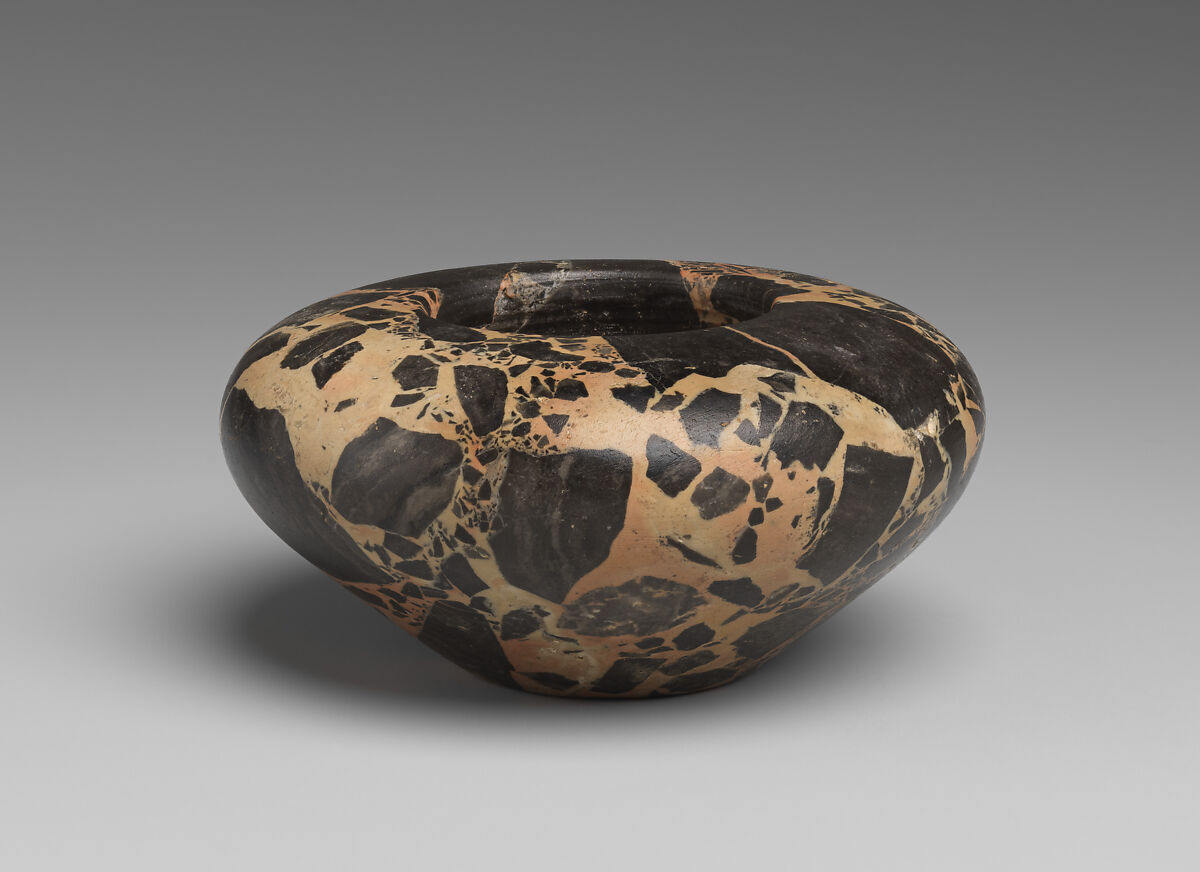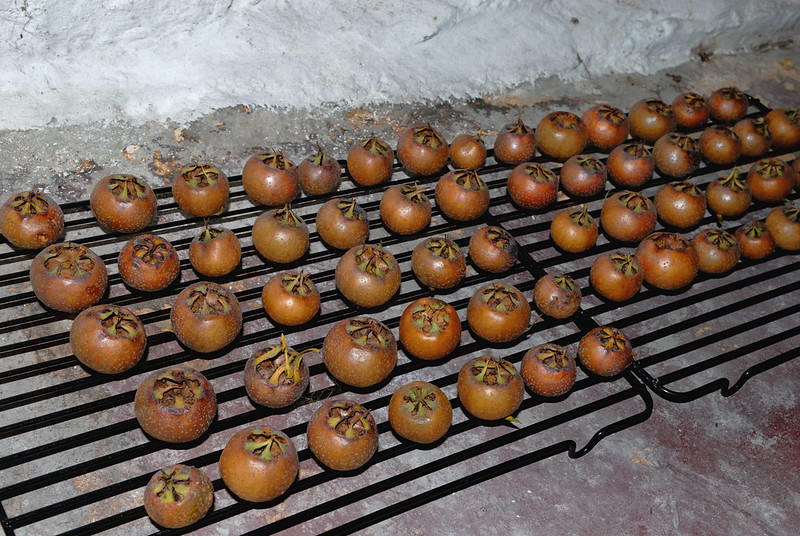In Fine Fettle

Breccia Bird's Nest Bowl, The Metropolitan Museum of Art.
It’s a well-trodden path to write a list of rare words you’d like to see in common usage. But who better to write this than me, the person who anticipated the vernacular usage of “cringe” and “main character” by several years? (citations not available).
Fettle comes to mind every time I wear sunglasses. I learned this word in pottery class in reference to using our fingertips to smooth out tong-marks on pieces that have been dipped in glaze and dried. This is also what I do to the makeup on the sides of my nose after I’ve been wearing glasses. As someone who generally takes a pretty finger-painty approach to cosmetics, I can definitely hold space in my vocabulary for another verb that can mean something between fudging, feathering and zhushing.
Blet is another one that I know from a specific context (bletted medlars) and can see having a wider application. “Bletted” is described as a state somewhere between ripeness and rottenness, which sounds pretty disgusting but apparently it's the thing to do with medlars. As far as I can tell it looks like you deliberately let it get brown and mushy. I’m not an adventurous eater in that way, but in the age of bed rot I think bletting could make a comeback. “I’m bletting my thesis”. Work with me here.

Medlars Bletting by Nicholas Turland
Also in the culinary vein we have macerate. I’m a big fan of letting things marinate in the metaphorical sense, but honestly for most of my life I’ve had no idea what macerating is, other than something to do with fruit. Well it turns out I’ve been a chronic macerator for years, because soaking dried fruit in something flavoured counts. And what am I doing if not macerating when I spend time with people who are more interesting than me?
Sapid just means pleasantly flavourful, but I think I made a note of it because it sounds so different from the thing it means. There’s potential larrikin behaviours there, perhaps exclaiming in an ambiguous tone at a potluck, “ugh this is sapid!” Or calling one of your friends a sapid bitch.
Refeeding is a term that I associate with people on Reddit who are into fasting, so why do I find it so evocative? To be fed implies a relationship, whether medical, familial or spiritual, beyond just eating. We already have a very popular vernacular usage of “eat” and “fed”. Refeeding is perhaps more niche, but I can see it having a parallel meaning of tending to someone starved in a mental or emotional sense. Refeed me with your kiss.
Bulking, cutting, lifting and overload have all crossed over into the mainstream, but what about deload? Deloading is when you switch from intensive to lighter exercise for a while so your body can recover. I’m gonna go ahead and say that it’s fine for normal people to recover just by resting and stretching a bit. The best gains I’ve ever had are from sitting on my ass for a week and going to bed early. I’m not really into lifting weights though so I guess it’s different if you’re really invested in building muscle. Anyway, wouldn’t it be nice to have a deload week at work before Christmas?
I must admit to doing a few fartleks at work. From the Swedish for “speed play”, fartlek training is kind of like running intervals but without keeping to specific time targets. I don’t really want to coin a whole new douchey philosophy for email jobs, but at least this one’s comedic and so vague that it can describe pretty much anyone’s work practices (sometimes work hard, sometimes work not hard).
Dunger is a family word. My sister thinks it’s from my mum’s dad who was an engineer, but apparently it’s pretty common in Australia and New Zealand. The dictionary thinks that it’s onomatopoeia from the sound a malfunctioning engine makes, so maybe my sister is onto something. However the way we said it was usually in reference to old clothes. There was a crawlspace at the top of a closet where we kept clothes that had come to the end of their useful life, and this was called “dunger heaven”. Great word.
Drat also takes me back. My family said this around me when I was young enough to think that “damn” was a really bad word. It’s satisfyingly snappy to say and makes you sound like Mr Burns. Drat summer when?
Smatch has already been adopted for a bunch of modern usages, most charmingly an app for finding sports buddies. It’s a less common variant of smack, in the sense of “this smacks of…”. Smatch can be a faint taste or smell or a small amount of something. However if you double down and say smatchet, you’d be referring to a WW2 era fighting knife. Do I detect a smatch of rust on your smatchet?
I swear I’ve heard my sister say “charf” to mean “chaff” and I think that’s not really a thing, but it sounds great. Perhaps she’d like draff, the damp remains of malt after brewing. A variant of dregs, but why not have another one? There’s enough dregs and draff in this world to justify it.
Loess and breccia are both geological terms and both have a beautiful mouthfeel. This is not an area that I have any particular knowledge of, but I sometimes fantasise about eating certain minerals and breccia looks delicious to me. Sharp clastic rocks in a fine-grained matrix? Sounds like textural heaven. Loess is as soft and beautiful as it sounds, a windblown sediment that forms a fertile and aerated soil. Given a little variation in particle size, loess can be loamy (another beautiful word). You might say that in organising sometimes we’re making breccia and sometimes we’re forming loess.
Hypertufa is a neologism for a lightweight cement-based material used in gardening and landscaping. It mimics a natural soft rock called tufa. I love the cadence of the word and the ring of optimistic hippie futurism. It also tickles me to imagine calling margerine hyperbutter.
Have you noticed how we don’t really say computer anymore? Everything is a device or a laptop or a workstation. Is computress then a radical anachronism? I for one would like some credit for being a gal who computes. I can see the aesthetic girlies getting into this.

My photograph from some exhibition I attended years ago, possibly at ACMI
The philtrum is the cuntiest part of the face. The word originates from Greek via Latin for “love charm”. Exquisite! Dare I say that we pay too much aesthetic attention to lips when the philtrum is right there? I don’t know if this word is widely used outside of people who are obsessed with facial aesthetics. I say name it, see it and appreciate it. Call me Philtrum Elverum cus I'm haunted by these things.
